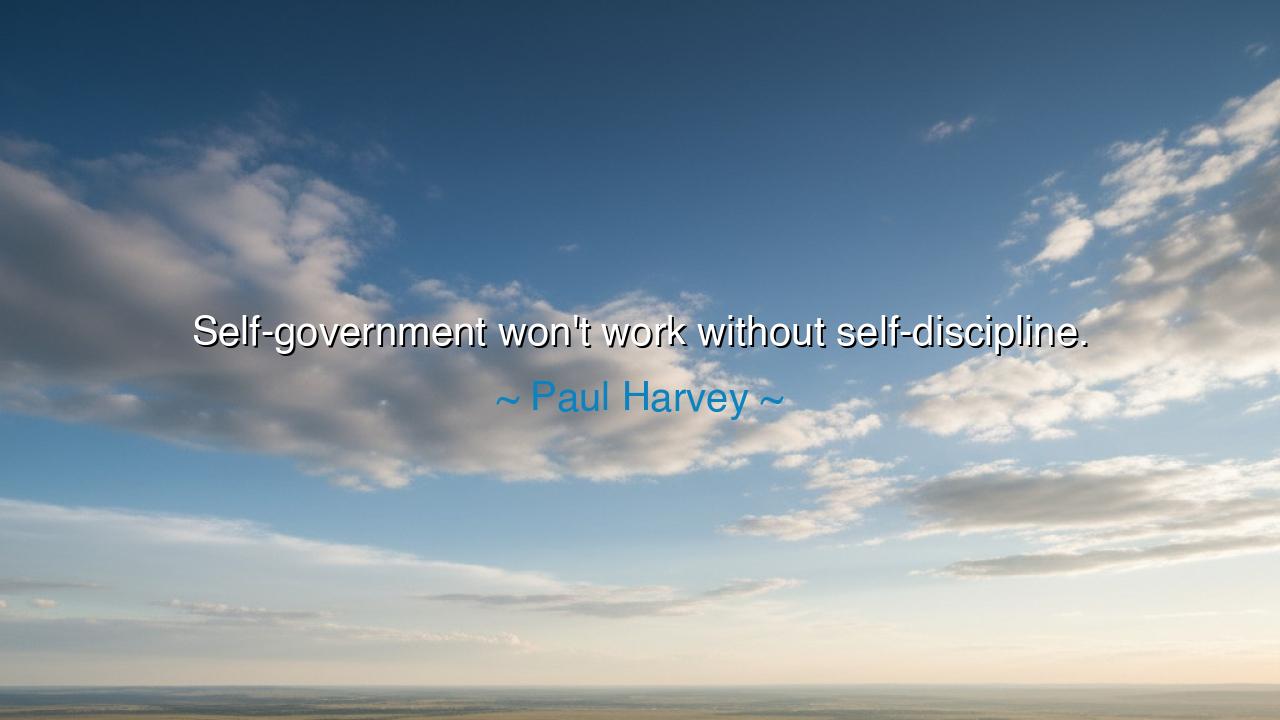
Self-government won't work without self-discipline.






The words of Paul Harvey—“Self-government won’t work without self-discipline”—resound with the solemn voice of civic wisdom. They remind us that liberty is not a gift of chaos, but a burden carried by those who have mastered themselves. For without discipline, freedom decays into disorder, and the house of democracy collapses beneath the weight of its own excess.
The ancients knew this truth well. The Greeks, who first dreamed of self-government, warned that the freedom of the polis could not endure unless its citizens governed their own desires. Plato taught that the man enslaved to appetite could never serve the common good; Aristotle counseled that virtue was the balance between excess and deficiency. Thus, Harvey speaks in their tradition, declaring that the health of a nation is born from the restraint of the individual.
Self-discipline is the armor that shields liberty. It demands patience, temperance, and sacrifice. The one who cannot command his own spirit cannot be trusted to wield power, whether over himself or others. The ancients compared it to the warrior’s training: before he could lead an army, he had to master his body, his mind, and his passions. In the same way, a people cannot govern themselves until each citizen has learned to master the impulses of selfishness and indulgence.
This truth is also heroic, for it calls us not to ease but to struggle. To live under self-government is not to cast off all restraint, but to take up a greater responsibility—the duty of virtue, of accountability, of choosing what is right even when no ruler commands it. It is to be both ruler and subject, king and servant, within the same soul.
So let this teaching be remembered: freedom is fragile without discipline, and democracy is but an illusion if its citizens are not steadfast. To govern oneself is the highest form of power, for it is from this mastery that all other governance flows. As the ancients taught, the man who conquers himself is greater than he who conquers cities. And from such men and women alone can a true self-government endure.






TNToann Nguyen
Paul Harvey makes an interesting point here. If we can't even control ourselves, how can we expect to manage our lives or society effectively? But I wonder, how do we stay disciplined when life throws so many challenges our way? What strategies do people use to develop lasting self-discipline? I feel like it's easier said than done, especially with all the distractions in the world today.
MNPham Thi My Na
This quote really resonates with me because it’s so true—self-governance is a reflection of our internal discipline. But what happens when we fail to exercise that discipline? How do we build a culture of self-discipline, not just on a personal level, but in larger communities? Is self-discipline something that can be nurtured collectively, or is it solely an individual responsibility?
HKNhut Huy Khuu
I agree with this quote, but I feel like self-discipline can be one of the hardest things to achieve, especially in a society that encourages short-term pleasure. Can self-discipline be learned, or is it something you're either born with or not? I wonder how much of self-governance is about setting up the right habits and systems to support discipline, as opposed to just relying on willpower alone.
CNchau nguyen
Paul Harvey's words hit home, especially in today’s fast-paced world where instant gratification often overrides long-term goals. How much of our success really depends on the ability to maintain self-discipline? And when we fail at self-discipline, how do we get back on track? Is it possible to still achieve self-governance without it, or do we just keep running in circles?
TTBui Trung Tin
This quote really gets me thinking about how self-discipline is the foundation of true self-governance. It's easy to point fingers at others or external systems when things go wrong, but without the discipline to make our own choices, how can we truly govern ourselves? I wonder, how do people stay disciplined in the face of distractions or temptation? Is it about consistency, or is there a deeper mindset needed?